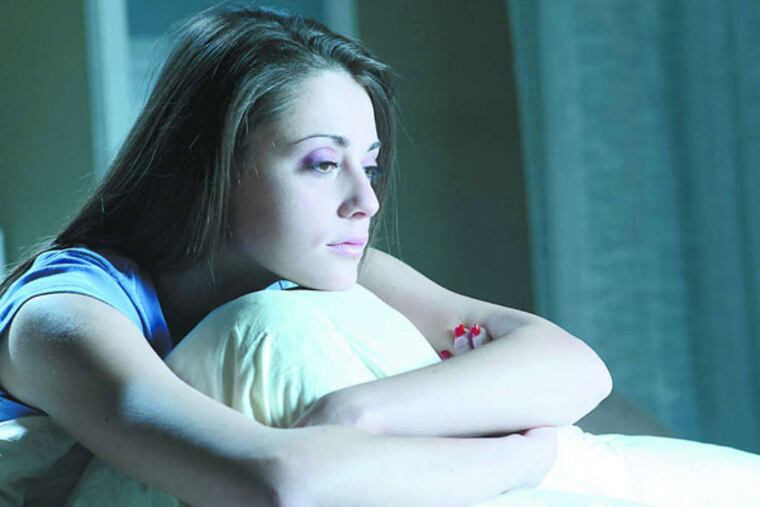Studies link Americans' lack of sleep to depression, other ills
Sleep experts are unanimous: Americans need more shut-eye. A third of the population gets less than seven hours of sleep a night, and the typical high school senior sleeps just 6.9 hours per night, according to a National Sleep Foundation poll.

Sleep experts are unanimous: Americans need more shut-eye. A third of the population gets less than seven hours of sleep a night, and the typical high school senior sleeps just 6.9 hours per night, according to a National Sleep Foundation poll.
"We are in an epidemic of sleeplessness," says Ilene Rosen, associate professor of clinical medicine at the University of Pennsylvania's Perelman School of Medicine, who is speaking out for a new national healthy sleep awareness project to encourage widespread and measurable improvement in the nation's sleep habits. The project is sponsored by the Centers for Disease Control and Prevention and the American Academy of Sleep Medicine.
"So many things get in the way of sleep," says Rosen. "We want to get people to think of sleep as important as diet or exercise."
Skimping on sleep can lead to a number of serious health issues: coronary artery disease, changes in hormone levels that control appetite and cause obesity, anxiety, and even car crashes due to fatigue. Though insomnia, the inability to fall asleep or stay asleep, has long been linked with depression, two new studies draw correlations between shortened sleep and depression. Shortened sleep can impact anyone, from shift employees who work at night to teenagers busy with homework or texting long past their prescribed bedtimes.
In the first study, published in the journal Sleep, researchers at the University of Washington in Seattle found a link between the heritability of depressive symptoms and sleep duration in 1,788 twins. Participants who slept less than seven hours a night "magnified the genetic influence toward depressive symptoms," as did, to a lesser extent, twins who slept more than nine hours a night. For the study, the optimal amount of sleep was considered to be between seven and nine hours.
"We were surprised by the extent of the effect of shortened sleep," says lead author Nathaniel Watson, codirector of the UW Medicine Sleep Center. "The heritability of depressive symptoms in the shorter sleeping group was almost twice that in the normal sleeping group."
"It's a very interesting study," says Karl Doghramji, medical director of the Jefferson Sleep Disorders Center. "It's one more paper that suggests that there may be a reciprocal or bidirectional relationship between sleep and depression." He notes that because the depressive symptoms were self-reported in the study, sometimes sleep-starved patients can have symptoms that mimic depressive symptoms. He treated a recent shift worker who appeared "slowed-down, lethargic, despondent, and no longer interested in pleasurable activities."
"If you didn't know she was a night-shift worker, you might think she had depressive symptoms," he says.
However, one of the most intriguing ideas in the Watson study, says Doghramji - who was not involved in the research - is that "if you can intervene in an individual's sleep, you might be able to prevent future depression."
A second study, from the University of Texas Health Science Center, also published in Sleep, examined 4,175 teens who slept fewer than six hours a night. When 3,134 were evaluated a year later, the data suggested, "reduced quantity of sleep increases risk for major depression, which in turn increases risk for decreased sleep."
"What this study clearly shows is that sleep deprivation in adolescents is predictive of later depression," says Jodi Mindell, associate director of the Sleep Disorders Center at Children's Hospital of Philadelphia. "The next step is to look at if not getting enough sleep predicts depression or if it is an earlier symptom or indicator of depression."
An important takeaway from the study, says Mindell - who was not involved in the study - is that "we are not sure why there is a relationship between depression and shortened sleep. This is a real call to action for parents, teachers, and health-care providers that they must absolutely ask teens about their sleep. And if they're not getting enough sleep, is there any reason to be concerned about depression?"
"There are so many things that get in the way of sleep," says Rosen. "People think they're unwinding when they use smartphones, watch HDTV, or use their iPads before sleep." But, she points out, all of this technology "throws off a wavelength of blue light that tells the brain it's time to be awake." Though there are apps you can load onto a computer that recognize your bedtime and automatically decrease the blue light, Rosen's best advice is "no technology in bed."
For adolescents, there is a triple whammy: their circadian rhythms keep them up later, as do their many activities; they are often out on the first school bus at dawn; and their bodies require nine hours of sleep a night. Given this, Mindell suggests sleep needs must always be addressed at teenagers' physical exams, asking not only whether they're having problems sleeping, but about how much sleep they're actually getting.
"We tend to think teenagers need less sleep," she says. "But teenagers need a lot of sleep: it's key to functioning now and in the future."
"We live in a toxic environment for sleep," agrees Watson. "It has real consequences on our lives and health. Concentrate on the quality rather than the quantity of the wakefulness experience."
And if you can't sleep or sleep too much? "Go see somebody and get it checked out."